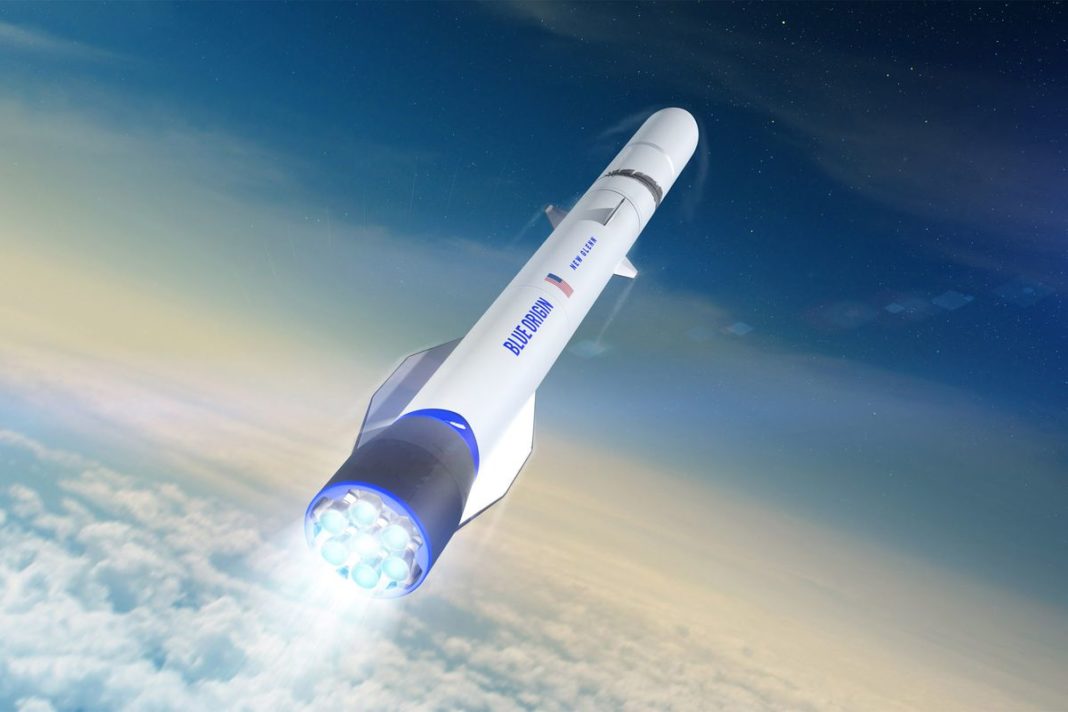The Air Force is going to change the criteria for selecting its next round of rocket launch providers after one company competing for the gig protested the procurement process, Space News first reported. Private spaceflight company Blue Origin argued that the selection benchmarks were unfair — an argument that was upheld this week by the Government Accountability Office (GAO).
Currently, the Air Force is on the hunt for two companies to launch the US’s national security satellites from 2022 to 2026 as part of its Launch Service Procurement program. For rocket companies, being selected is a huge opportunity, as it could result in hundreds of millions to billions of dollars in launch contracts. The Air Force put out a call for proposals in May, and submissions were due by August 12th. Four companies are competing for the coveted positions: SpaceX and the United Launch Alliance, which already launch national security payloads as well as Blue Origin and Northrop Grumman.
Blue Origin has been criticizing the program as flawed
For most of this year, Blue Origin has been criticizing the program as flawed. For one, the company claims it doesn’t make sense for the Air Force to pick just two providers, arguing it would create a “market duopoly in national security space launch.” Blue Origin also has taken issue with the method by which the Air Force will make its selections. According to the original criteria, the Air Force planned to pick the two launch providers that make the best combination together. Blue Origin noted that was unfair, as it was unclear what other competitors would bid, making it difficult to present the best options to the Air Force.
The company listed a number of other concerns as well, such as ambiguous phrasing and the ability to present a backup launch option — something that some competitors have but Blue Origin doesn’t. The company argues that these criteria favor those companies that already launch satellites for the Air Force. Blue Origin hasn’t been completely snubbed by the Air Force — the company did receive development money from the Air Force to develop its future New Glenn rocket for the government program — but Blue Origin’s rocket is still in development and has yet to actually fly. All three of the other competitors have launched rockets to orbit before.
On the day that proposals were due in August, Blue Origin filed a bid protest with the GAO, citing all of its concerns. This week, the GAO sided with Blue Origin on one major point, noting that it was unfair for the Air Force to make its selection as a combination. “This methodology, as described by the agency, however, does not provide a reasonable, common basis on which offerors will be expected to compete and have their proposals evaluated,” the GAO said in a statement. The GAO recommended that the Air Force revise its criteria to fix this. The office did not agree with Blue Origin on the company’s other concerns, however, saying the provisions were “reasonable and in accordance with applicable procurement law and regulation.”
Now, the Air Force is following the GAO’s lead
Now, the Air Force is following the GAO’s lead, and it will amend its selection criteria so that each launch provider is evaluated independently of one another, instead of in combination with others. “On the whole, we are pleased that the GAO upheld the major components of the National Security Space Launch competition, especially award timelines, quantities, and period of performance,” Will Roper, the assistant secretary of the Air Force for acquisition, technology and logistics, said in a statement. “In the case of finding ambiguous the ‘when combined’ RFP language for selecting the best pair of launch companies, we will implement GAO’s recommendation in a manner that should not materially delay contract award.”
Ultimately, Blue Origin expressed optimism regarding the GAO’s decision. “We want to thank GAO for their careful consideration of these serious issues, thoroughly reviewing the facts of the case, and recognizing the importance of ensuring evaluation criteria that are unambiguous and comply with federal procurement statutes and regulations,” Bob Smith, Blue Origin’s CEO, said in a statement.
Now that the Air Force is amending its criteria, the organization will need to alert those in the competition to the changes. But just because the criteria are changing does not necessarily mean Blue Origin will be selected. The Air Force is planning to make its final selections sometime in the middle of next year.













![Hotstar Premium Cookies 2019 [*100% Working & Daily Updated*] Hotstar Premium Cookies 2019 [*100% Working & Daily Updated*]](https://tahav.com/wp-content/uploads/2019/11/Hotstar-Premium-Cookies-Free-100x70.jpg)



